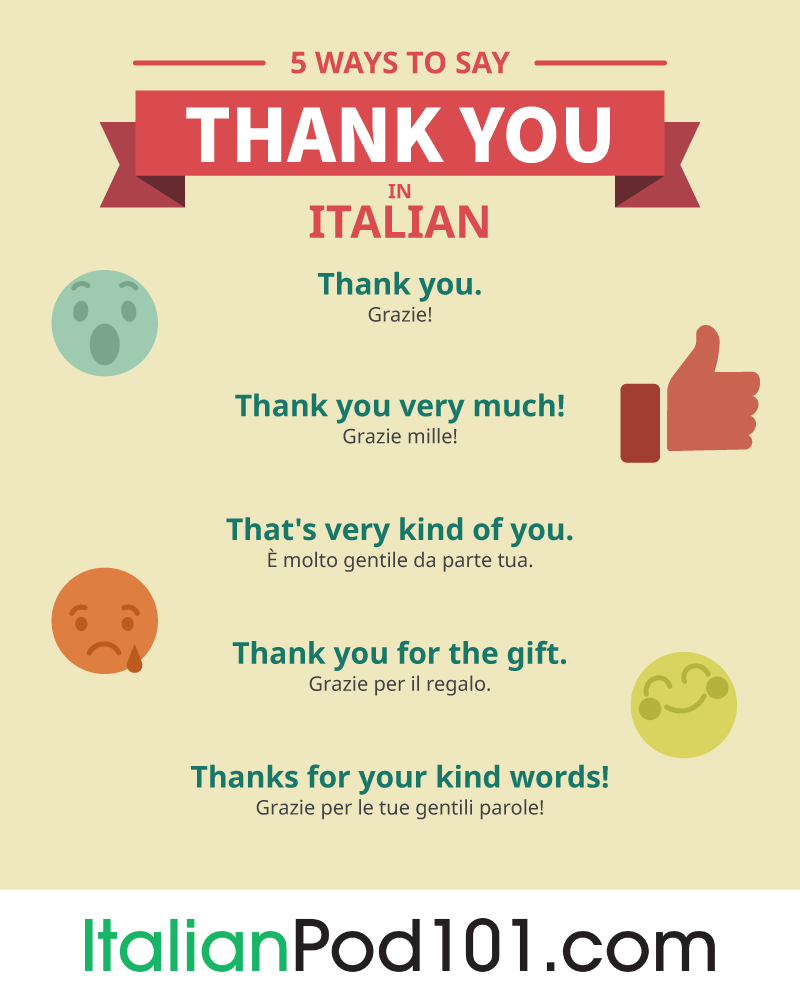Every culture in the world have their own customs and etiquette regarding the most important aspects of social life: from dining to celebrations, from greetings to traveling, and so on. For someone coming from a different culture, they can be hard to understand and adopt, but they’re indeed an important element in communicating with the local population and learning their culture.
In order to help you with this, ItalianPod101 has written a guide to the Italian customs and etiquette. With our Italian etiquette tips under your belt, you have no reason to be nervous when an Italian friend invites you to dinner or when you’re going to travel to Italy for business reasons. Everyone will remember you as the educated, nice foreigner who surprised them by perfectly knowing the Italian customs. For tourists, knowing even a small bit of Italian etiquette can go a long way!
Table of Contents
- How to Talk about Etiquette in Italian
- Italian Dining Etiquette: The Do’s and Don’ts for Dining in Italy
- The Do’s and Don’ts for Sightseeing
- The Do’s and Don’ts for Greetings
- The Do’s and Don’ts for Visiting a House in Italy
- The Do’s and Don’ts When Riding Public Means of Transportation
- The Do’s and Don’ts for Business
- The Do’s and Don’ts for Celebrations
- Learn Everything about Italian Culture and Customs with ItalianPod101
1. How to Talk about Etiquette in Italian
First of all, a super-short language lesson. Let’s say, for example, that you find yourself in a new situation and you’d like to know the Italian culture customs regarding the circumstance. You’d like to ask an Italian friend or colleague, but how? What are the verbs and sentences to talk about etiquette in Italian? How do you know about proper Italian etiquette for your current situation?
1- Dovere
When talking about customs and etiquette, you usually use the modal verb dovere and/or the imperative form. Dovere means “to have to,” and can also mean “should” and “must.” Let’s see a couple of examples:
Example: Quando ti presenti a qualcuno, devi stringergli la mano.
Translation: “When you introduce yourself to someone, you should shake their hands.”
Example: Quando saluti una persona giovane, devi dire ‘ciao.’
Translation: “When you say hello to a young person, you should say ‘ciao.’
2- The Imperative Verb
ItalianPod101 has prepared a couple of great lessons on the affirmative imperative and the negative imperative.You can check them out to know everything about this form. But for the purpose of this article, here’s a couple of examples regarding Italian etiquette:
Example: Mangia con la bocca chiusa.
Translation: “Eat with a closed mouth.”
Example: Non toglierti le scarpe quando entri in una casa.
Translation: “Don’t take your shoes off when you go into a house.”
2. Italian Dining Etiquette: The Do’s and Don’ts for Dining in Italy
Here’s some Italian etiquette for tourists willing to explore the universe of Italian food and wine. The most important rules of Italian dining etiquette are:
- Wait for everyone to be served before starting to eat: In some cultures, eating together is more about sitting at a table together than it is about actually consuming the food. The Italian culture is not one of them. Before starting to eat, make sure that everyone is served and ready to start. Not waiting for everyone to start at the same time is considered very rude.
- Always say Buon appetito!: This is another key rule of Italian dining etiquette. Before starting to eat, you should always say Buon appetito! to your tablemates. Literally, this expression means “Good appetite,” but it really means, in context, “Enjoy your meal.”
- Always serve your tablemates before yourself: When helping yourself with food or wine, always start with the others at your table and serve yourself last. Don’t worry; you don’t need to serve thirty people if you’re at a big dinner, just focus on serving the guests next to you. Kindness and generosity are highly appreciated at Italian tables.
- Make a toast before starting to drink alcohol: Like the Buon appetito! is mandatory before starting to eat, so is a toast before starting to drink. Raise your glass and say Salute! or Cin cin!, then wait for your guests to join the toast.
- Don’t talk with your mouth full: Italians really don’t like to see how the food looks in your mouth.
- Don’t burp: In some countries, for example in India, burping is a sign of satisfaction and satiety. But in Italy, it’s unacceptable. Basically, you should avoid every loud sound—slurping is another good example.
- When eating in the streets, beware of municipal rules: This isn’t properly about etiquette, but more about local laws. Given the huge number of tourists and the current boom of street food, some Italian municipalities have forbidden eating on the street. You should ask your host or tourist office about this to avoid expensive fines.
- You’re allowed to use your bread to clean the plate as long as you’re NOT holding the bread with your hands! Make sure to cut the bread into bite-sized pieces, and to hold it with your fork to clean the plate. That’s a delicious rule.
3. The Do’s and Don’ts for Sightseeing
Some tourists don’t really know how to behave when visiting a foreign country. And as Italy is a very popular destination, this becomes clear. Follow this list of Italian etiquette do’s and don’ts for tourists to be the visitor every Italian likes. Also note that specific Italian culture customs come into play here.
- Talk with a low voice in churches and other holy places: Holy places are usually very quiet in Italy, and everyone visiting them is requested to respect this silence. You’re allowed to talk, but only with a low voice.
- Turn your mobile phone off or on silent in churches and other holy places: People that don’t do this are considered very disrespectful.
- Don’t go where people are praying: People who are praying need calmness and respect. Don’t go next to them, and be quiet when you pass near them. This includes the “clicks” of your camera or cell phone. Some churches, especially the most-visited ones, have an area only for prayers. Don’t go there.
- Don’t point to people: Italians don’t like people pointing to them with their fingers. It makes them feel like animals at a zoo.
- Ask for permission before photographing someone: For the same reason, you should always ask their permission before taking a photo of someone.
- Be sensible with selfies: Selfies are a fun habit but also a curse of the current era, because they make us behave stupidly sometimes. We think about the people that will look at our photo on social media, and not about those around us. So, be sensible. Before taking a selfie, make sure that you’re not acting disrespectfully. For example, if you’re taking a selfie in front of a monument for the victims of WWII, this is considered disrespectful.
4. The Do’s and Don’ts for Greetings
We’ve already written a super interesting guide about greetings in Italy, but here are a few Italian etiquette tips.
- Smile: Italians communicate a lot with their facial expressions and body language, and have a really hard time with people who don’t. If you don’t smile to someone when greeting or introducing yourself to them, they’ll think you’re rude or hate them.
- Shake hands: Shaking hands is a key part of Italian etiquette when you meet someone new or when you greet a business contact. It’s also common among acquaintances, especially among men.
- Kiss your friends and relatives twice on their cheeks: Italians do kiss, a lot. Not as much as the French do, but almost. You should kiss your friends and relatives twice on their cheeks when saying hello and goodbye. All of them. Yes, it’s a lot of kissing and they love it.
- Don’t be too formal: Italians tend to be warmer in their manners than many other populations, and generally don’t like formalities too much. Just try to adapt to the level of formality they use toward you.
5. The Do’s and Don’ts for Visiting a House in Italy
Here are Italian etiquette rules for being a good guest in an Italian house. These simple tips for etiquette in Italy for tourists can go a long way toward impressing your host and leaving a good impression on potential friends.
- Don’t take your shoes off: In many parts of the world, you have to take your shoes off to show your respect in someone else’s house. In Italy, it’s the opposite. So, if you’re not asked to, don’t ever take your shoes off.
- Don’t wander around alone: Moving freely around someone else’s home is considered rude and inappropriate.
- Accept something they offer: Leaving a house without having a coffee, a piece of cake, or even just a glass of water might disappoint your host. Let them welcome you.
6. The Do’s and Don’ts When Riding Public Means of Transportation
Busses and trains are often crowded and stressful, which is why you should be super kind when riding them. These are the basic rules of etiquette in Italy for tourists using public transportation:
- Give your seat to old people, the disabled, pregnant women, and children.
- Don’t speak too loud, especially on the phone, and don’t listen to music without headphones.
- Say Permesso when you need to pass: This is the magic word that shows kindness to those traveling with you, like “excuse me” in English.
7. The Do’s and Don’ts for Business
Knowing the Italian etiquette is especially crucial when doing business with Italians. Here’s some good advice when it comes to Italian customs in business.
- Don’t talk about money right away: Yes, it’s weird, but money is a delicate issue for Italians. Don’t forget that for many centuries, the Church called it “the devil’s poo,” and even in today’s more secular century, there’s still something dirty about it. Don’t start talking about it at the beginning of a conversation, especially if it’s a large amount. It’s better to spend a few minutes talking about other aspects of the business before discussing the financial side.
- Appreciate other people’s work: Be sure to show appreciation toward other people’s work, even if you won’t close any deal. You’ll leave a good impression and be able to build a good reputation.
- Shake hands: After you’ve reached a business deal, shake hands.
8. The Do’s and Don’ts for Celebrations
What if you’re invited to a wedding or, unfortunately, you have to attend a funeral? Check out our advice here.
- Don’t dress in bright colors at a funeral: Instead, dress soberly, using dark colors.
- Say Condoglianze to offer condolences.
- Don’t eat at a funeral: In Italy, mourning isn’t considered an occasion to eat together. Instead, eating at funerals is almost a taboo. People at funerals just gather together and remember the deceased.
- Say Congratulazioni to offer congratulations: For example, you can say this at a wedding, a baptism, a graduation, etc.
9. Learn Everything about Italian Culture and Customs with ItalianPod101
What do you think about Italian customs and etiquette? Does your country have similar expectations? Let us know in the comments!
ItalianPod101 isn’t simply a place to learn the Italian language. It’s also a hub of information covering Italian culture and customs from many different points of view. Care to know more about how friendship works in Italy? You got it! Or do you want to move there to work? We got you covered!
And with our apps and tools, you’ll learn faster and in a fun, entertaining way, like you’ve never experienced before! Let us be your ladder to success as you master the Italian language!
Still don’t feel like you know everything you need about Italian etiquette and customs? Check out our in-depth articles and guides, like the ones we linked to throughout this article.



















